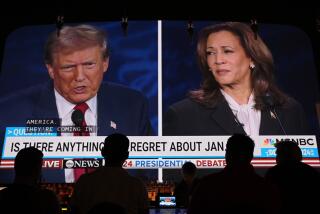Bad Luck for Online Gaming
- Share via
Online gambling companies were grappling with a new crisis Monday after the Senate quietly passed a bill forbidding American banks and credit card companies from processing payments to them.
Shares of publicly traded Internet gaming operators plummeted on the London Stock Exchange after the measure was attached as a rider to a bill designed to enhance U.S. port security and passed late Friday.
The House passed a similar bill this year, and the legislation is expected to be signed by President Bush. It prohibits banks and credit card companies from making payments to online gaming websites that appear on a list to be drafted within nine months by the Justice Department and the Federal Reserve.
Online websites also would be prohibited from accepting U.S. payments, but because most are based overseas, the ability of U.S. authorities to prosecute them is uncertain.
Also unclear is what sort of gambling falls under the prohibition. Although Internet sports betting is plainly outlawed by the federal Wire Act, there is some doubt whether online poker or other games fall under the same prohibition.
“That’s a major weakness” of the new measure, said I. Nelson Rose, an expert in gambling law at Whittier Law School.
“It left out expanding the reach of the Wire Act, so poker sites can say, ‘We’re not covered by that.’ ”
The gambling provision’s late-night passage took many in the gaming world by surprise. Many thought the Senate bill was dead in the current session, meaning that both houses of Congress would have to start from scratch next year.
U.S. casinos were neutral on the bill. Although they don’t like the offshore competition, domestic gambling companies might someday want to open their own online casinos.
Online gaming companies headquartered in Britain were among those taking the biggest hit from the measure. Although most have been trying in recent months to wean themselves from the U.S. market as the threat of congressional regulation has risen, American customers still account for the greatest share of their business.
“This development is a significant setback for our company, our shareholders, our players and our industry,” said Mitch Garber, chief executive of PartyGaming Ltd., the operator of the PartyPoker website, in a statement.
Shares of PartyGaming, based in Gibraltar, lost 58% in Monday’s trading in London.
Shares of Neteller, a British payment processing company based on the Isle of Man, fell more than 60%. Such companies have sprung up in recent years after American payment processors, such as the PayPal subsidiary of EBay Inc., voluntarily ceased accepting payments to online gambling sites.
In a statement issued after the Senate vote, Neteller said, “It is currently unclear how Neteller, a European company, with no assets, presence or employees in the U.S., would be affected by this bill.” The company said it would have a “clearer view” after U.S. authorities issued the regulations.
U.S. banks and credit card companies have generally ceased transferring funds for internet gambling over concerns that they could be charged with aiding and abetting illegal activities. But they have opposed legislation that makes them criminally liable for such transfers, arguing that in many cases they don’t have the ability to determine whether a recipient is a gambling website.
Representatives of industry groups said Monday that they were satisfied that the new bill took that difficulty into account.
“We wanted to be sure that there was some protection if we act in good faith,” said Floyd Stoner, executive director for congressional relations at the American Bankers Assn.
The Senate’s action followed a string of other legal attacks in the U.S. on the online gaming industry. In July, David Carruthers, CEO of London-listed firm BetOnSports, was arrested while making an international air connection in Dallas. Charges against him include racketeering and mail fraud.
Last month Peter Dicks, then chairman of Sportingbet, a British online company, was arrested at New York’s Kennedy Airport on a warrant alleging that he violated a Louisiana law barring online gambling. Dicks was released and returned to Britain on Friday.
More to Read
Sign up for Essential California
The most important California stories and recommendations in your inbox every morning.
You may occasionally receive promotional content from the Los Angeles Times.













